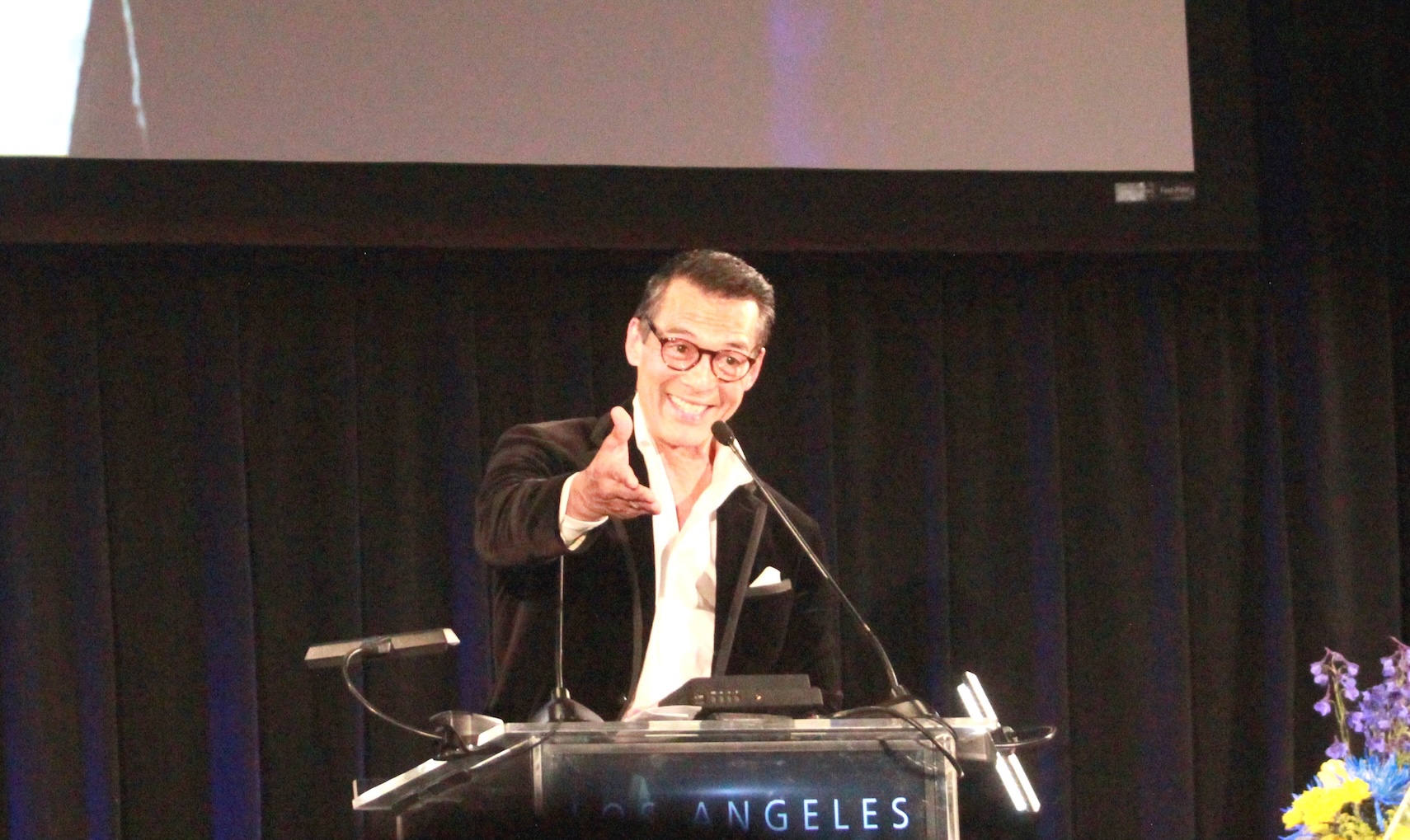David Ono speaks at the 65th annual Los Angeles Press Club’s Southern California Journalism Awards in 2023,
when he was awarded the Joseph M. Quinn Award for Lifetime Achievement. (Photo: George Toshio Johnston)
The L.A. TV journalist wins awards and
finds personal rewards as a storyteller.
By George Toshio Johnston, P.C. Senior Editor
When “Jaws” hit theaters in 1975, it became an instant classic. One of the lines of dialogue that also became an instant classic was when Amity Island police chief Martin Brody deadpanned, after a close encounter with the great white shark, “You’re gonna need a bigger boat.”
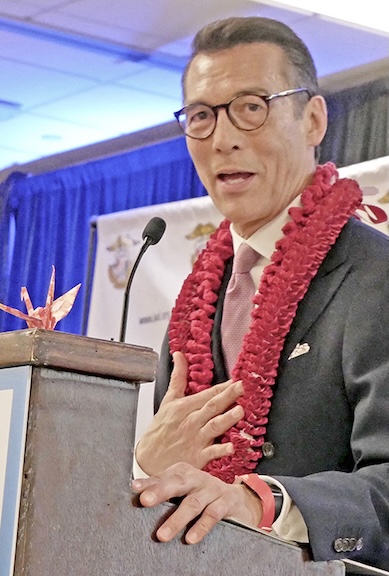
David Ono addresses the Sayonara Gala audience in Philadelphia on July 13, when he was honored with a Japanese American of the Biennium Award in the arts / literature/ communications category at the 2024 JACL National Convention. (Photo: Gil Asakawa)
Similarly, for KABC Channel 7 news anchor David Ono — who after nearly three decades of working in the Los Angeles TV market has himself achieved classic status among the legions of telejournalists who have appeared on the local airwaves over the past several decades — one might look over his list of awards he has amassed over the years — and just recently — and say, “You’re gonna need a bigger trophy room.”
In the past couple of years alone, Ono has received more professional accolades than one mere shelf could hold, among them in 2024 an Edward R. Murrow award from the Radio Television Digital News Assn. for best news series in America for “FACEism” to KABC-TV* and the team behind the series, his 12th Murrow award, a Japanese American of the Biennium award in the category of arts/literature/communications from the JACL at its 2024 National Convention and the Legacy Award from the Japanese American National Museum for his live/multimedia “Defining Courage” (see Nov. 4, 2022, Pacific Citizen, tinyurl.com/yc7w8kv7).
Add to that 31 Emmys, two RTDNA National Unity Awards, six Asian American Journalists Association National Journalism Awards, a Distinguished Journalist Award from the Society of Professional Journalists and, in 2021, the Order of the Rising Sun, Gold Rays with Rosette decoration from the Japanese government.
But who’s counting? Because here’s the thing about Ono: As much as he no doubt appreciates getting recognized for his work (and who doesn’t?), for him, journalism is not about the awards. Someone who would know firsthand is his self-described “work wife,” fellow ABC7 news anchor Ellen Leyva. In a video recorded for the Los Angeles AAJA chapter’s 2024 Lunar New Year Party, she said, “Here’s the thing about David. His real passion is storytelling. That’s his spark.”
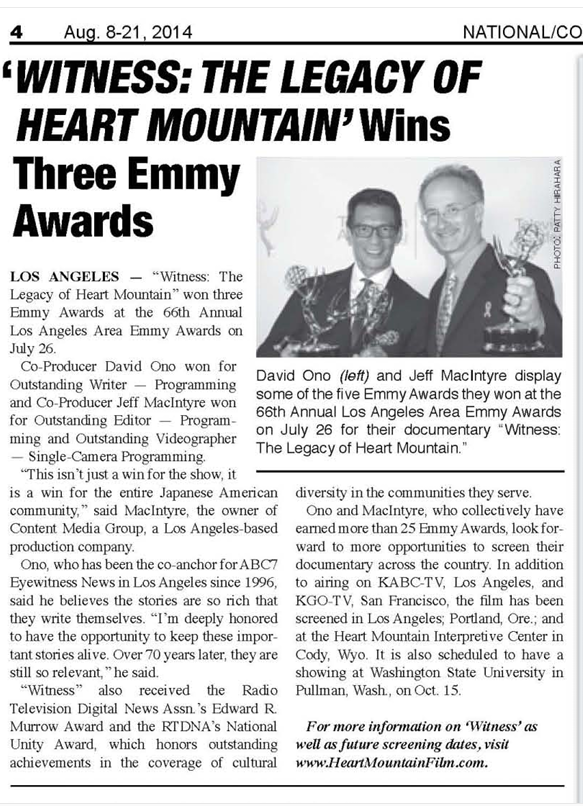
A Pacific Citizen article from 2014 reported the Emmy win by David Ono and his producing partner, Jeff MacIntyre, for “Witness: The Legacy of Heart Mountain.”
And when he’s not engaged in journalistic storytelling like working on an award-winning project like his “FACEism” series or “Defining Courage,” Ono can be found performing master of ceremony duties with humor, grace and aplomb for Japanese American and Asian American community organizations like JACL, JANM, Go for Broke National Education Center and AAJA.
Also speaking at the L.A.-AAJA Lunar New Year Party was JANM President and CEO Ann Burroughs, who also began to notice how Ono was more often than not on hand to lend a hand as the emcee for various events. “I slowly got to realize this was somebody who wasn’t just emceeing these events because of his star power,” she said. “He was asked to emcee these events because he cared so incredibly deeply about each of those organizations, about each of those missions, about what they stood for, and about what the people did, who worked there and why they worked there.”
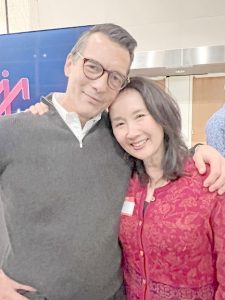
KABC Channel 7 news anchor David Ono and Los Angeles Times reporter Teresa Watanabe at the Los Angeles chapter of Asian American Journalists Assn.’s Lunar New Year party on Jan. 27 at JANM. (Photo: George Toshio Johnston)
With all the professional accolades, recognition and acceptance Ono has received in his nearly three decades working in the L.A. market, there is no doubt that he made his bones here, becoming the TV news equivalent of a sports franchise’s superstar who is the face of his team. Since arriving in L.A., he also hasn’t station-hopped in a quest for a bigger payday. He remains a KABC newsman to this day.
“Because of my time at ABC7, they’ve allowed me to evolve as a journalist, and they’ve allowed me to be more and more creative and more unique in what I deliver to our audience,” Ono said. “And so I’m happy about that, and I have this opportunity that almost nobody else has, and that is to create what I want to create in a form that I want to create. And if I want to be really creative and take some risks and do it in a different way entirely, they’ll let me, and I think that’s really important because the vast majority of people are highly restricted on what they can and can’t do.”
That doesn’t mean, however, that making the leap from the L.A. market to a national network gig was a move Ono never contemplated. After all, Tom Brokaw, Connie Chung and Ann Curry made names for themselves in Los Angeles before going to the news division at a Big Three network. Why not him, too? But those examples reflect a different ecosystem of a generation or two ago, when the power and prestige of working as, say, the news anchor of “The CBS Evening News” was a really big deal, a career pinnacle.
As it turns out, Ono could have followed that path prior to coming to Los Angeles. “I did get multiple network offers. I turned them down, or I wasn’t available via my contract,” Ono told the Pacific Citizen. “I had, I would say, three legitimate offers to go to the network, and one of them was really, really good. I literally turned that one down. I even had an office already set up in New York, but I hadn’t signed the contract yet, and that’s when L.A. came around, and I decided to stay local and come to L.A. instead. And that was a good offer.”
In retrospect, it was a crossroads moment for Ono that worked out for the best for him, his career and his new hometown. Not only did his career’s rise coincide with the tectonic shifts that saw the bedrock of legacy TV networks weaken, coming to Los Angeles was an opportunity to put his TV news career into overdrive.
But the X factor of him coming to the part of the country with the largest Japanese American population in the contiguous United States created a synergy and personal evolution that simply would not have happened in the Big Apple.
As he has noted onstage while facilitating events, even though Ono considered himself a history buff, he was chagrined to learn how little he knew from attending schools and growing up in Texas of the travails his fellow Japanese Americans experienced during World War II, namely the abrogation of civil liberties and constitutional protections that are supposed to be part of the American promise. Coming to L.A. also allowed him to learn from still-living individuals of the exemplary valor of Japanese Americans who served their country during those trying times.
Thanks to his natural curiosity and position as a TV newsman, with the reach and resources that provided him, Ono would start a years-long deep dive into learning about that overarching story and sharing it, whether it was via his Emmy-winning “Witness: The Legacy of Heart Mountain” or the acclaimed “Defining Courage.”
Remarkably, there was no master plan behind “Defining Courage.” According to Ono, it was more along the lines of a “demo on innovative storytelling.”
“It was an accident, but it was also an effort to take those storytelling skills and make it really kind of deeply personal and impactful to a smaller audience,” he said. “And I don’t think ‘Defining Courage’ would have existed maybe 15 years ago, but it exists now.”
And, lest anyone think telling that story of Nisei veterans has allowed him to do well by doing good, think again. “I don’t make a penny on it,” said Ono. “I actually lose money because a lot of it comes out of my own pocket, but I love doing it because it resonates so well with the community. . . . That’s rewarding.”
Still, as he revealed while addressing his fellow journalists at January’s Lunar New Year party, he has been questioned about his commitment to telling stories about the Japanese American experience to a wider audience.
“I was always told, ‘Why do you concentrate so much on Japanese Americans? It’s such a small community when you can be bringing your skills to something bigger, to more people?’ And I always felt that the answer to that was because all of us live in a microcosm, we’re all human, and all of our stories are connected. What happened to Japanese Americans during WWII can certainly be relatable to the rest of the folks who aspire to be in America, to believe in democracy, to believe in what this country stands for. It doesn’t matter how many people are within this community. What matters is the importance of the story.”
Just as the TV news game is not the same as it was 30 years ago, neither is Ono. For one, he’s married and the father of a 13-year-old. “Anybody who has a child understands that a whole new world opens up to them, a whole new, scary, frightening, pressure-filled world,” said Ono. “And I think that’s good for a journalist. I think it’s good to see the perspective of people who have so much weight on their shoulders, where they’re not only worrying about themselves, but they’re worrying about their family and their children, their children’s future, and that’s important to understand as we go forward and tell the stories we need to tell.”
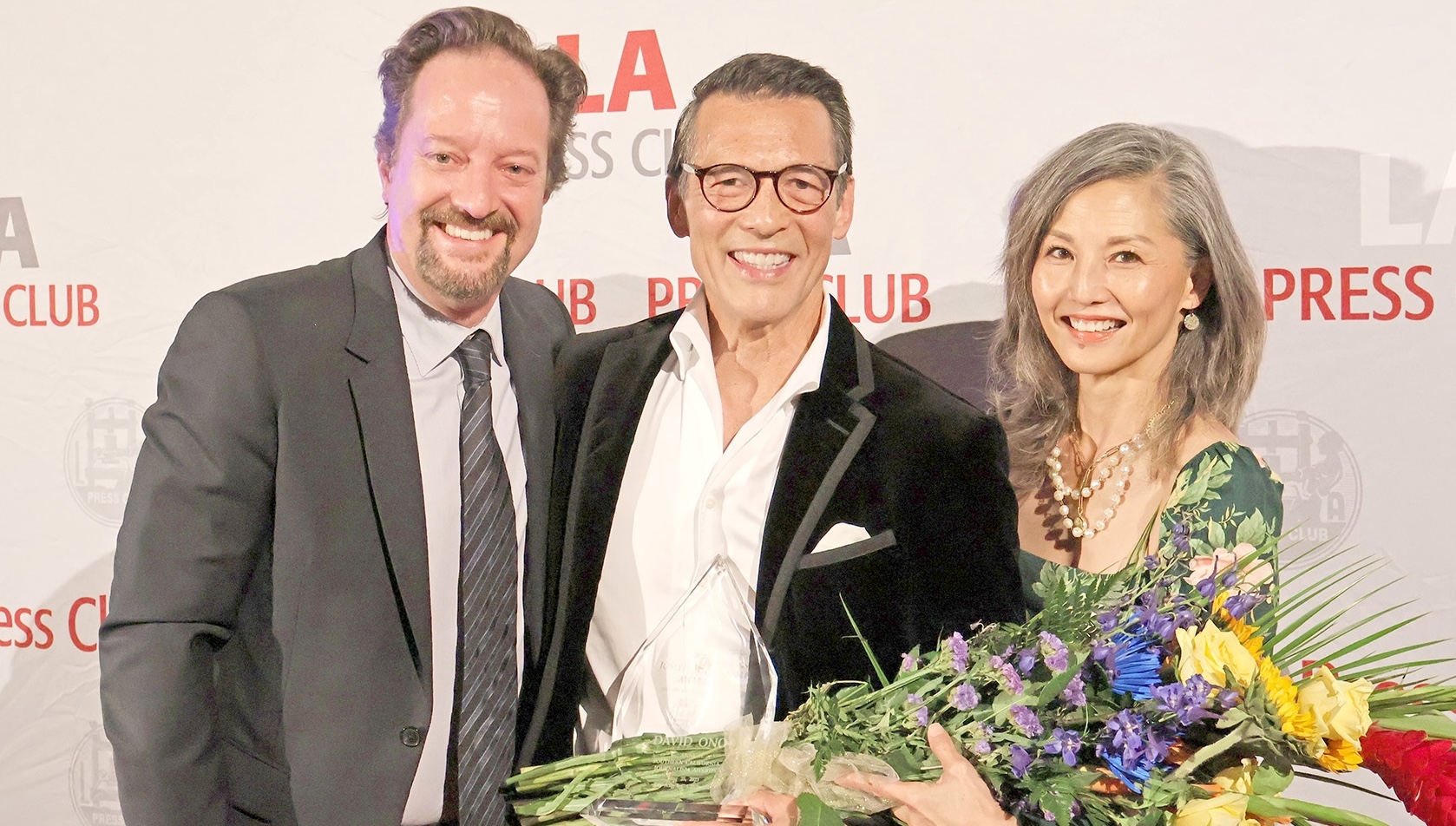
Married couple Daniel Blinkoff and Tamlyn Tomita flank David Ono at the 65th annual Los Angeles Press Club’s Southern California Journalism Awards in 2023, at which he was awarded the Joseph M. Quinn Award for Lifetime Achievement.(Photo: George Toshio Johnston)
Although career longevity may still be easier in TV journalism, where appearance and visuals matter greatly, Ono has nevertheless crossed over the 60-year threshold. However, he’s not ready to call it a career.
“I obviously don’t have 40 years ahead of me, but I think I could have maybe 10 really good years of hard work, and that’s why I’m working harder now than I’ve ever worked in my life,” said Ono. “People say it’s unhealthy. I don’t think it’s unhealthy because it drives me. It keeps my brain working, it keeps me moving. And I think that’s important in life.
“But now that I’m older, I’m kind of really into this new evolution of my career with ‘Defining Courage.’ . . . I think there’s a lot of other projects that are now coming up that kind of put me more in the realm of filmmaking.”
What might some of those other projects entail? “I’m working on a letters project,” Ono said. “I really would love to continue to gather the personal letters of members of our community during the war, going back and forth between the soldiers in the Pacific and Europe, as well as folks in camp or Hawaii or at home, prewar and during the war, as well a little bit postwar.
“It breaks my heart to hear when I talk to families who say, ‘We destroyed all of those letters from back then because they just were sitting around.’ I feel like we need to put the word out — ‘Don’t do that!’ They’re like gold. They’re so valuable. If you feel like you have no place to put those beautiful artifacts, send them to me, or at least get me copies of them. Send me what they said because I think we’re going to be coming out with a beautiful piece in a couple of years that is going to be deeply personal to the community. And I definitely need their help.”
As might be expected, journalism has shaped, driven and consumed Ono for much of his adult life. But it’s a vocation that has been hurting and shrinking contemporaneously to his journalism career, despite all those awards, accolades and trophies he as amassed. Is there, then, any wisdom he can pass along to younger people who, despite the challenges, are looking to become working journalists?
Said Ono: “I think that an important lesson to learn if you’re a journalist is to follow your heart. Tell a good story. Let things fall into place. Always keep your eyes open and know who your friends are that can help you.”
(Editor’s Note: Videos from Ono’s FACEism project may be viewed at faceism.org.)
*Murrow awards go to news organizations, not individuals.

